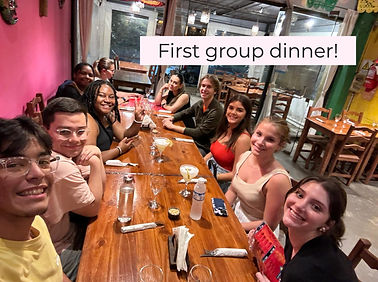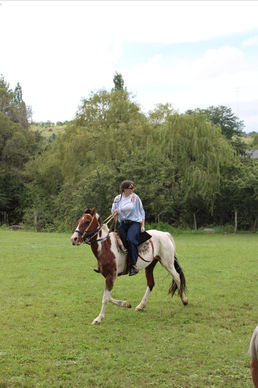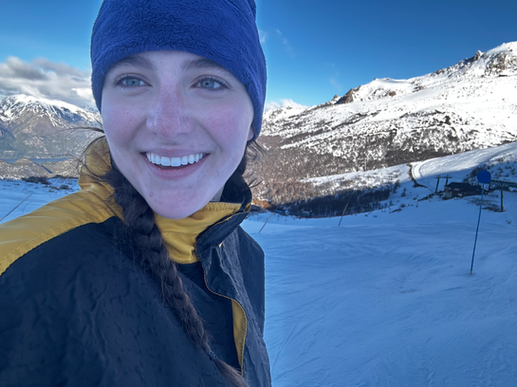
Córdoba, Argentina
Study Abroad - Spring 2024
In the spring semester of 2024, I spent my time learning, working, and living in Córdoba, Argentina. My program was a direct partnership between two universities; Clemson and Universidad Blas Pascal. This was to give us the feeling of going to Clemson but in Argentina, like a home away from home. The professors and administrators had been working with Clemson and its students for years, making the process not only smooth and easy but comfortable and fun. Beyond the specifications of the trip, I knew nothing about Argentina outside of Messi, the soccer player. I had information that people had told me, that they spoke a different kind of Spanish, produced amazing beef, and were amazing at soccer. I tried to research more but I knew I would never fully grasp any of the information until I saw it first-hand. I went into the country as a blank slate with less than satisfactory Spanish and was ready to learn. In the beginning, I was very nervous, not just because I was going to a new country, but because I also had the inherent American stereotypes I was working hard to not believe. I had been taught by the American media at a young age that South America was a dangerous place with lots of firearms and crime. I knew that more likely than not, this was not true. But I had to find out on my own, without the help of my parents and my usual support system what was true and what wasn’t. I am fortunate enough to have a pretty extensive travel background and through those experiences, I have found a love for learning about new cultures and trying my best to assimilate myself to my environment. So while I had things told to me about Argentina and preconceived notions about what I was going to face, I was determined to make my own judgments and become a part of the society that was being laid out in front of me.
In Córdoba, I lived with a large host family that included people from lots of different generations, which gave me a great feel for the culture on multiple levels. It was this group of people that helped me the most when it came to learning, improving, and perfecting my Spanish, which was my main goal when going into the semester. My goals were simple but very important to me. I wanted to hone my Spanish to a conversational level that anyone who spoke Spanish could understand, to assimilate into the culture as much as possible, and to build a community of people around me in which I felt comfortable and at home. All of these tasks seemed monumental and impossible, but I was determined and knew, one way or another, they would come to fruition. The only way to achieve these things was total immersion, home, work, school, everything. I am the type of person who likes to have things to be familiar around them, the grocery store, the restaurants, the people, the homes, so it was a daunting task and one I did not think was prepared to take on. As time went on, I felt uncomfortable with my surroundings and felt like I stuck out amongst people in the community. I knew not to panic or feel too estranged when there were slight social differences, like a lack of understanding of an American-style latte or an (in my opinion) unsatisfactory level of ice in a glass of water. But I longed for the comfort of familiarity, faces, streets, and even a simple hello. I craved to order at a restaurant and know the exact words to say without fail or frustration. But day by day and month by month I grew more and more comfortable with all aspects of life in Argentina. My Spanish became more second nature, my host family seemed like old friends instead of strangers, and the culture around me felt as if it were more normal than strange.
What helped in my ability to adapt to my new life was my affinity for finding connections. I loved to connect things I knew from home to things I found while abroad. Not only real, tangible objects but also attitudes and people. The way certain people dressed, the things they liked to do, and certain opinions they held about topics and events. Each step I took toward finding things that made me feel more at home, the more at home I felt. For example, the main pastime in Argentina is soccer, without a doubt. At first, I found their energy and madness for the sport scared me. I did not understand the crazed excitement over a game that held no real significance for the people within the society, especially when they were facing political and economic hardship of their own. This reminded me of Americans and their relationship to football, which I understand is very easily parallel. But the passion and distraction to the world around them are tied and connect two different hemispheres together. They use the teams as a way of unifying themselves as a community and have those ties no matter where they are in the world. Some people could see it as silly because of its superfluous nature and seemingly no importance when it comes to the world., but it has importance because it means something to the people in that country, and it reflects in almost every other country in the world.
One of the most drastic differences between American and Argentinian cultures came from my experiences in the workplace. In the United States, I grew up around lots of business facilitation because my family was heavily involved in it. I saw how people dressed, shook hands, greeted each other, and practiced strict hierarchies. Based on those experiences, I expected to find that to be the case when I started my internships in Córdoba, however, that couldn't have been further from the case. When I got there the dress was casual, the discussions were informal, and the bosses conversed freely with their employees as if they were friends. They were still able to achieve the same level of success within the business, but on a level that was much more manageable for the employees to have a good work/life balance and a pleasant experience in the workplace itself. It became difficult to assimilate to their environment because I found myself following the rules of another country and it was making me stand out in the natural order of their work. After I adapted to their ways I found that I was having fun while also doing my job, which I never thought was possible before. It was interesting to see the approaches of the two cultures that yielded similar results in the end. It also showed me that there are always many ways to approach a single situation that can have major effects on the process of getting to the finish line.
Small pieces of information and cultural knowledge like this made it much easier to find a home in the southern hemisphere. I was able to find things that reminded me of home and also contrasted with it in a joyous way. I went into the experience knowing nothing would be the same as in the U.S., and by the end, I was grateful for it. I know I have a well-rounded version of the world, not only because I’ve seen it and spent maybe a week there, but because I lived it and became one of them.























